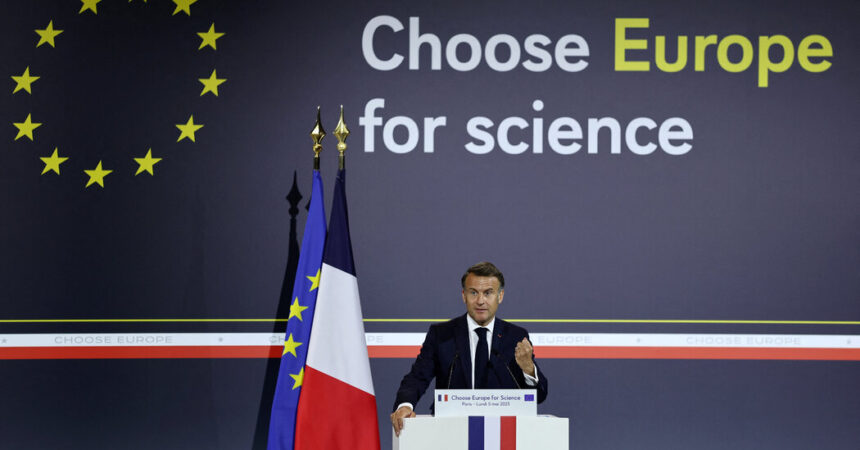As the Trump administration cuts support for research institutions and threatens to freeze federal funds to universities such as Harvard and Columbia, European leaders are offering financial help to researchers based in the United States and hoping to benefit from what they call calling A are called that they call them to be called a arefalcular. “
“No one could imagine a few years ago that one of the great democracies of the world would eliminate research programs under the pretext that the word ‘diversity’ appeared in his program,” President Emmanuel Macron de France said Monday.
It was a talk at the University of Sorbonne in Paris during an event called Choose Europe for Science that was organized by the French government and the European Union.
It was unthinkable, Macron said, also referring to the withdrawal of the visas of the researchers in the United States, that a nation whose “economy depends so heavy on free science” would make such an error. “
Ursula von der Leyen, president of the European Commission, announced an investment of 500 million euros, or $ 566 million, at the conference to “make Europe a magnet for researchers” in the next two years.
Altheheh that amount is not much comments with the million in cuts to the American universities of Cortes, comes the International Research Program of $ 105 billion called Horizon Europe that supports scientific advances, said Mrs. von der Leyen.
He did not mention the United States by name, but described a global environment where “fundamental and open research is questioned.”
“What a gigantic calculation error!” She said.
In Europe, there is a broad feeling that Trump has abandoned the traditional support of the United States to freedom, freedom of expression and democracy through his hug to autocrats and the assault on science and academia. That has created strains, but also a sense of opportunity in the continent, where to attract the best scientific mind to vigorous and independent universities is considered part of a broader campaign to “travel” to Europe as an independent power.
In the long term, the European Commission, the executive arm of the European Union, plans to double subsidies for the investigators who move and consecrated the freedom of scientific research in a law called the Law of the European Research Area.
“The first priority is to ensure that science in Europe remains open and free. That is our presentation card,” said Mrs. von der Leyen.
The Trump administration attack on science and threats to universities was the main momentum for the conference, attended by government ministers and prominent researchers in Europe. More and more, the United States is seen as a strategic adversary, and opening doors to American researchers and scientists is considered a long -term response to that challenge.
Mr. Macron’s message to scientists was this: “If you love freedom, come and help us remain free.”
France announced its own program to attract researchers based in the United States last month. The Government promised universities and research institutions in the country to 50 percent of the funds necessary to attract international researchers, including those working in areas under pressure from the Trump administration such as climatic studies and low carbon energy. But no particular funds were announced until Monday, when Macron said his government would commit $ 113 million to the program.
The alarms in Europe sounded when the Trump administration reduced Frozer’s jobs and subsidies in the main US institutions as part of cost reduction measures. European dismay increased when the United States government attacked diversity programs and tried to dictate to universities “to those who can admit and hire, and that the areas of study and research can carry out”, in the words of Harvard president, Alan M. Garber.
Harvard has filed a lawsuit against the Trump administration in its freezing federal funds of $ 2.2 billion. Mr. Trump was verified last week about ending Harvard’s tax.
The Us Government Has Also Fire Staff At Us Centers DeMed To Be at the Pinnacle of Scientific Research, Including at the National Oceanic and Atmospheric Administration, The National Science Foundation, The CENDERS FOR HEALTHY OR THE FUNDANCE AND THE FUNDENCE AND THE FUNDENCE AND THE FUNDENCE AND THE FUNDENCE AND THE FUNDENCE AND THE Fundence and the Fundence and the Fundence and the Fundance and the Fundia or The Fundance and the Fundia Or the Fundence and the Fundia or The Fundence and La Fundia or the Foundation and the Fundancia and the Fundancia and the Foundation and the Fundancia and the Fundance and the Fundance and the Fundancia and the Drevention of Fame and the Derenvention of Fame and the Research of Fame.
At the same time, some federal agencies have eliminated the words of the websites and subsidy requests that were considered unacceptable for the Trump administration. Among the terms considered taboo are “climate science”, “diversity” and “gender.”
Tasks together, the actions have sent a chill through the Academy and Research Institutes, with scientists concerned not only for their work but also about the long -term viability of their research.
“In the United States, once a paradise for researchers, academic freedom is being challenged. The line between truth and falsehood, between the facts and belief, the blessed weakened,” said Elisabeth Borne, Minister of Education of France, on Monday when she opened the conference.
Universities in France have been at the forefront of attempts to benefit from a possible American brain leakage. The University of Aix Marseille is interviewing some 300 candidates for its Safe Place for Science program, which launched in March in response to the Trump administration cuts. Since then, many other universities and institutions have followed their example.
“Our own interest, as well as our values, now order us to be the refuge for knowledge wherever it is under pressure,” said Luis Vassy, president of the University of Sciences Po in Paris.
François Hollande, a former French president, has proposed a law to create a state of “scientific refugee” for researchers threatened for their work in their countries.
However, some bosses and university professors have criticized the initiative. They argue that although France tries to draw American researchers, it also has the higher education and higher education budgets to address the country’s budget deficit.









